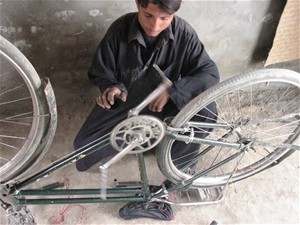
Ashraf Khan fixes a bicycle in his shop, which he opened after completing a USAID-funded bicycle repair course. The shop provides a steady income for Mr. Khan and his family.
USAID/LGCD
Bicycle repair vocational training empowers young entrepreneurs in Khost.
13 JUNE 2010 | KHOST PROVINCE, AFGHANISTAN
An estimated 68 percent of the Afghan population is below 25 years of age, and most lack educational and employment opportunities. Faced with these challenges, many Afghan youth turn to the insurgency as a means of supporting their families. Therefore, providing vocational training and economic opportunities for young men is one of the keys to achieving stability. As part of this effort, USAID is helping young men in Khost Province to learn to repair one of the district’s primary means of transportation: the bicycle.
Supported by a grant from USAID’s Local Governance and Community Development (LGCD) project, the National Youth Council of Khost recently concluded a bicycle maintenance vocational skills course for 60 unemployed young men in Khost City. The trainees learned to fit and fix an entire bicycle, and received advice on leveraging these practical skills into a profitable small business.
The two-month training ended in late February 2010, and graduates are putting their new skills to use. “We have five bicycles in our home, and before [the training] we were forced to bring them to the city for repair,” said a trainee named Nimatullah. “Now I am able to repair the bicycles in my own home. The village where I live has 30 homes and most of the villagers have bicycles. All the villagers now bring their bicycles to me for repairs.” Ashraf Khan, another participant who has already opened his own workshop, proudly reports earning a steady income that he believes will continue to increase.
Faced with limited economic opportunity, Afghan youth often turn to criminal activities to make a living. This trend can change if they are offered the chance to learn a vocational skill and empowered to succeed in the private sector. The Afghan Government’s National Youth Program aims to increase young Afghans’ participation in the stabilization and development of their country, while promoting non-formal educational opportunities to develop skills that can lead to better quality of life and livelihood opportunities.
As one of USAID’s stabilization programs, LGCD works to engage communities in unstable areas to take an active role in their own security, and addresses priority grievances of at-risk populations through integrated community development projects.







Comment
Make a general inquiry or suggest an improvement.